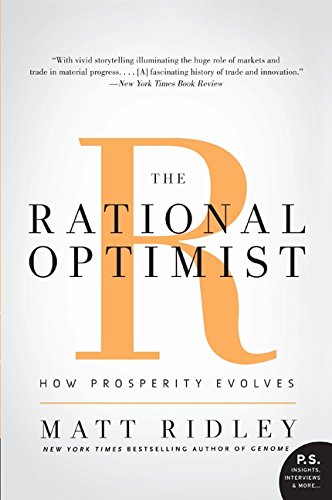Matt Ridley makes a fascinating case in The Rational Optimist: that humanity, in general, has improved and progressed and will continue to do so. Personally, I am more of an optimist than a pessimist, and I thoroughly enjoyed the book, even though I have some disagreements with Ridley’s philosophies and conclusions at times. How has prosperity evolved?
Trade and Ideas: The Fundamentals of Optimism
Ridley is a fierce advocate for economic liberalism, positing that free trade and specialization of labor are the impetus of prosperity that we should embrace. Trade, he argues, has given humans more time, made us all – even the poor – richer, driven innovation and encouraged cooperation. Imagine spending $1,500 and six months of labor to make your own sandwich.
Because of trade, specialization, and free market capitalism, you don’t have to ever do that. Instead, you head to your nearest supermarket, spend a small amount of money on safe-to-eat ingredients (thank you, FDA), head home, and enjoy your sandwich. I’ll reckon you’re even confronted with myriad options at your chosen grocery store.
The sandwich example makes clear how trade has driven prosperity; indeed, we are worse off spending exorbitant amounts of resources making sandwiches when, instead, we could be investing those resources doing some other form of work.
It is the sum of ideas and trade that drive innovation. These are inextricable. Ridley argues that humans share a “collective intelligence” and that our ideas “have sex,” reproducing, evolving, and generating innovation that propels us forward. If you’re interested in a book about the history of innovation, I recommend The Innovators by Walter Isaacson.
“Without trade, innovation just does not happen. Exchange is to technology as sex is to evolution. It stimulates novelty.”
–The Rational Optimist, Chapter 2
Recommendation
Overall, this is an excellent read because I learned a lot about historical trends that demonstrate why we should be rationally optimistic. The continual triumph of society and humanity provides evidence that optimism, as an ideology, outperforms pessimism again and again.
While I disagree with several of Ridley’s viewpoints on specific issues such as climate change (he downplays the threat) and government regulation (he disdains bureaucracy and doesn’t sufficiently credit government for its role in producing prosperity), the overall body of work is valuable and positive. This book challenged some of my pessimistic tendencies, educated me on a variety of topics, exposed me to new ideas, and refined my framework for analyzing the world.
For as long as Earth continues to spin, society will continue to shift in ways that sometimes evoke discomfort: political, economic, technological, and cultural changes come to mind. But I implore you to look forward to those shifts and to be excited about the future. Allow your optimism to eclipse your pessimism. I dare you.
Get your copy of Matt Ridley’s The Rational Optimist today

One thought to “The Rational Optimist”